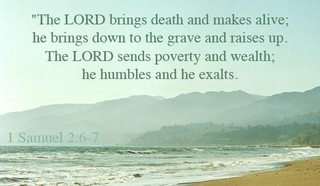
- Recent Translations
- All Translations
1 Samuel 2
Share
Settings
1 Samuel 2 Commentary
Chapter 2
Hannah's song of thanksgiving. (1-10) The wickedness of Eli's sons, Samuel's ministry. (11-26) The prophecy against Eli's family. (27-36)
Verses 1-10 Hannah's heart rejoiced, not in Samuel, but in the Lord. She looks beyond the gift, and praises the Giver. She rejoiced in the salvation of the Lord, and in expectation of His coming, who is the whole salvation of his people. The strong are soon weakened, and the weak are soon strengthened, when God pleases. Are we poor? God made us poor, which is a good reason why we should be content, and make up our minds to our condition. Are we rich? God made us rich, which is a good reason why we should be thankful, and serve him cheerfully, and do good with the abundance he gives us. He respects not man's wisdom or fancied excellences, but chooses those whom the world accounts foolish, teaching them to feel their guilt, and to value his free and precious salvation. This prophecy looks to the kingdom of Christ, that kingdom of grace, of which Hannah speaks, after having spoken largely of the kingdom of providence. And here is the first time that we meet with the name MESSIAH, or his Anointed. The subjects of Christ's kingdom will be safe, and the enemies of it will be ruined; for the Anointed, the Lord Christ, is able to save, and to destroy.
Verses 11-26 Samuel, being devoted to the Lord in a special manner, was from a child employed about the sanctuary in the services he was capable of. As he did this with a pious disposition of mind, it was called ministering unto the Lord. He received a blessing from the Lord. Those young people who serve God as well as they can, he will enable to improve, that they may serve him better. Eli shunned trouble and exertion. This led him to indulge his children, without using parental authority to restrain and correct them when young. He winked at the abuses in the service of the sanctuary till they became customs, and led to abominations; and his sons, who should have taught those that engaged in the service of the sanctuary what was good, solicited them to wickedness. Their offence was committed even in offering the sacrifices for sins, which typified the atonement of the Saviour! Sins against the remedy, the atonement itself, are most dangerous, they tread under foot the blood of the covenant. Eli's reproof was far too mild and gentle. In general, none are more abandoned than the degenerate children of godly persons, when they break through restraints.
Verses 27-36 Those who allow their children in any evil way, and do not use their authority to restrain and punish them, in effect honour them more than God. Let Eli's example excite parents earnestly to strive against the beginnings of wickedness, and to train up their children in the nurture and admonition of the Lord. In the midst of the sentence against the house of Eli, mercy is promised to Israel. God's work shall never fall to the ground for want of hands to carry it on. Christ is that merciful and faithful High Priest, whom God raised up when the Levitical priesthood was thrown off, who in all things did his Father's mind, and for whom God will build a sure house, build it on a rock, so that hell cannot prevail against it.
1 Samuel 2 Commentaries
Chapter Summary
INTRODUCTION TO FIRST SAMUEL 2
In this chapter the song of Hannah is recorded, 1Sa 2:1-10, and an account is given of the return of Elkanah and Hannah to their own home, and of the care she took yearly to provide a coat for Samuel, and of her being blessed with many other children, and of the growth and ministry of Samuel before the Lord, 1Sa 2:11,18-21,26, and of the wickedness of the sons of Eli, 1Sa 2:12-17, and of Eli's too gentle treatment of them when he reproved them for it, 1Sa 2:22-25 and of a sharp message sent him from the Lord on that account, threatening destruction to his house, of which the death of his two sons would be a sign, 1Sa 2:27-36.

